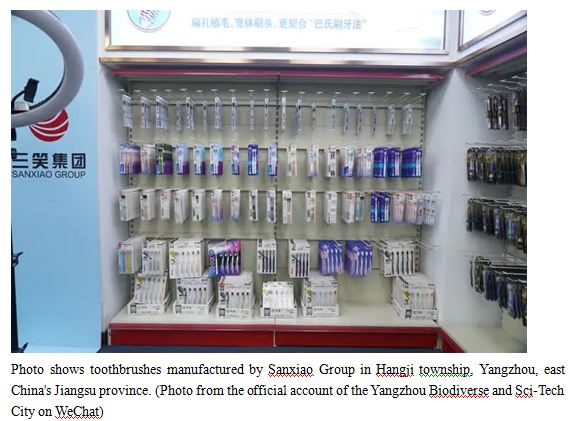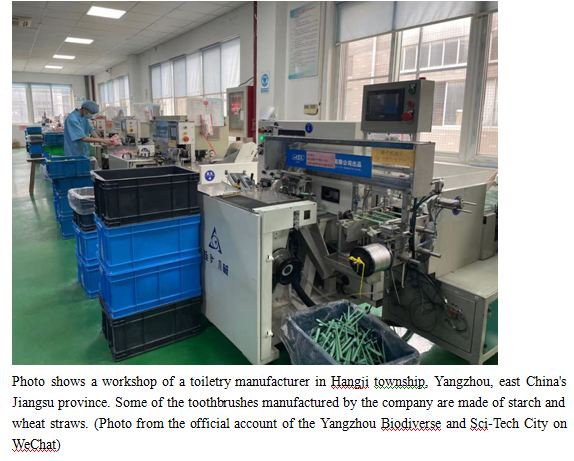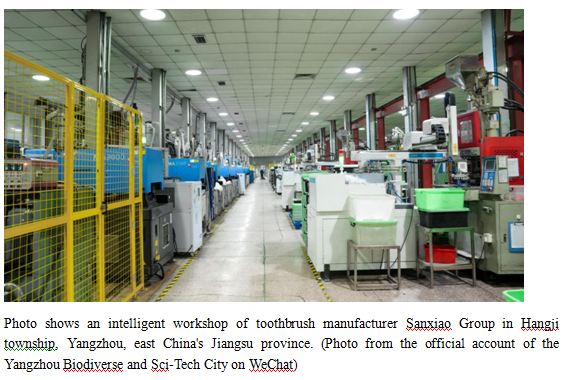By Xu Qing, People’s Daily
“Toothbrushes manufactured in Hangji can be found in every piece of inhabited land.” This is what’s written in the China Toothbrush Museum in Hangji township, Yangzhou, east China’s Jiangsu province.
Hangji, which covers only 40 square kilometers with a population of less than 40,000, is the world’s largest manufacturing base of oral care products and toiletries. It produces 7.5 billion toothbrushes each year with an annual output of more than 13 billion yuan (about $1.91 billion). One out of every three toothbrushes in the world is manufactured in the township, known as the “toothbrush capital” of China.
Many of the toothbrushes manufactured in Hangji are hotel disposables. In the past, the township had no ways but to engage in price wars and extend its product line to win a share in the market, in which products were highly homogeneous. It was once trapped in destructive competition that forced it to sell its toothbrushes at 0.1 yuan per unit.
As green production and lifestyles gained more and more public foundation, a revolution unavoidably came to the production of disposable toothbrushes, which have a maximum service life of two days and run against the philosophy of green development.
Seeking opportunities and strength from green development, and driving innovation in technologies and products with green philosophies, Hangji found the key to green transition.
Having a good nose for the market, toothbrush manufacturers in Hangji adjusted their development strategies in a timely manner as lifestyles turned greener.
On July 1, 2019, Shanghai issued new regulations on the management of domestic waste, demanding that hotels should not provide disposables for consumers unless asked. The regulations also stipulate that disposable products shall be environment-friendly.
Following the issuance of the regulations, Hangji’s manufacturers launched disposable toothbrushes with detachable heads, whose food-grade plastic handles can be recycled and then made into plastic stools or trashcans. This innovative design not only promotes waste recycling and reduces pollution and wasting of resources, but also has created new space of development for enterprises.
Since 2021, many luxury hotels in Dubai have started using a bamboo-handled toothbrush that’s beautifully designed and environment-friendly. This toothbrush was manufactured in Hangji.
It was seemingly easy to make the bamboo handle of the toothbrush. However, the handle would be rough and fragile if unsuitable materials are adopted. China is known as the kingdom of bamboo. Hangji has made full use of local bamboo resources and manufactured smooth and resilient handles with high-quality bamboos. The upgrading broke new ground and was a move that embodied the philosophy of green development.
Relying on independent innovation, Hangji has improved its capability in green transition.
A toothbrush manufacturer in the township, in cooperation with the National Engineering Research Center for Nanotechnology, developed an environment-friendly toothbrush made of sugarcane straws generated in sugar refinery, which is completely degradable. The toothbrush has been recommended by dental clinics in Germany, Sweden and many other countries.
It was because of independent innovation that the Hangji manufacturer with a history of more than 40 years has overcome negative influence from COVID-19 and other factors and blazed a new trail that features high-end and differentiated products.
Small as they may seem, toothbrushes reflect the long-term vision for green development and embody the philosophy of innovation-driven development. The new trend of green consumption has created valuable opportunities for the development of an innovative economy.
When more and more enterprises are taking action to turn the philosophy of green development into the power for innovation, creating new experiences of green consumption and leading the society toward greener lifestyles, a beautiful China featuring participatory social governance is in the making.



















